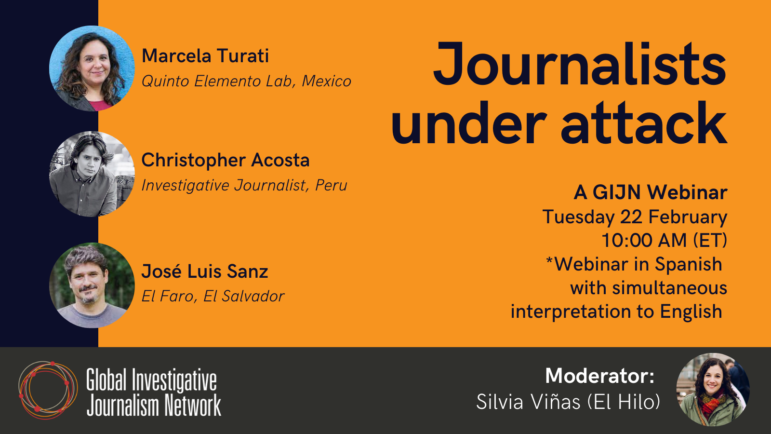The sentencing of Peruvian journalist Christopher Acosta, author of “Plata Como Cancha” (“Cash By the Bucket”), and his editor at Penguin Random House for criminal libel has caused consternation around the world. Although the two-year sentence was suspended — the hefty fine was not — this direct threat to freedom of expression is part of a worrying global trend.
As the ideals and practices of investigative journalism spread worldwide, a backlash of autocrats, oligarchs, and kleptocrats has arisen. Watchdog reporters are under fire almost everywhere, suffering unprecedented levels of harassment, surveillance, legal persecution, and physical abuse. Yet, despite this, journalists are pushing back, continuing to hold the powerful to account, while working collaboratively to expose those behind these attacks.
This GIJN webinar brings together three extraordinary journalists on the front lines in Latin America, a region that is especially dangerous for our profession. Journalists everywhere can learn from them: they have fought legal battles, been tracked with intrusive spyware, and received death threats for their work. How do they work and what do they do to better ensure their safety and security?
Christopher Acosta is a Peruvian investigative journalist whose reports have revealed corruption, financial fraud, and organized crime. His bylines include the magazine Poder; the newspapers La República and El Comercio; and Latina Television, where he today leads the Investigation Unit. He has been a fellow of the García Márquez Foundation, Georgetown University, and the Lincoln Institute. He also organizes the Latin American Conference of Investigative Journalism (COLPIN).
José Luis Sanz is director of the digital newspaper El Faro in El Salvador. He is a founding member of Sala Negra, an investigative team with El Faro specializing in organized crime and violence in Central America. His work has been published in essay collections including “Jonathan no tiene tatuajes” (2009), “Crónicas Negras. Desde una región que no cuenta” (2013), and “TerrorZones: Gewalt und Gegenwehr in Lateinamerika” (2015).
Marcela Turati is an independent journalist in Mexico. In 2007, she co-founded Periodistas de a Pie, an organization that promotes investigation into human rights abuses. Since 2014, she has worked on numerous investigative projects, including one on the disappearance of 43 students in Ayotzinapa, and more specifically the role played by the military in their disappearance. In 2016, she co-founded Quinto Elemento Lab, an investigative news outlet which also mentors journalists.
The moderator is Silvia Viñas, executive producer and co-host of El Hilo, a weekly narrative news podcast from Radio Ambulante Studios. She previously worked as an editor and producer for Radio Ambulante, a Spanish-language podcast distributed by NPR.
This event will be in Spanish with simultaneous English translation.
Watch our Twitter feed @gijn and newsletter for details on future events.
Sign up for the webinar here!
Date: Tuesday 22 February 2022
Time:
9:00 AM (Mexico City)
10:00 (Washington, DC, Toronto, Bogotá, Caracas)
12:00 (Buenos Aires)
15:00 (London)
16:00 (Madrid, Berlin, Tunis, Paris)
17:00 (Cairo, Johannesburg, Amman)
18:00 (Moscow, Kampala, Nairobi, Istanbul)
20:00 (Islamabad)
20:30 (Delhi)
21:00 (Dhaka)
22:00 (Bangkok, Jakarta, Hanoi)
23:00 (Hong Kong, Kuala Lumpur, Manila)
00:00 (Tokyo, Seoul)
02:00 (Sydney)

